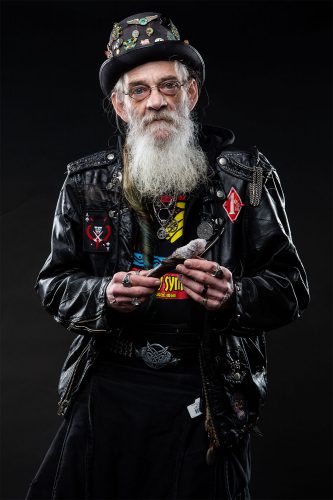
Four months ago, Hedin Manus Brugh was ticketed for selling his art at Wayne Morse Free Speech Plaza during Saturday Market without a permit — something he did for the past seven years.
On Oct. 30 Brugh went to court to explain his frustration with the ticket and permit requirements, but was still found guilty of unauthorized vending.
The ticket is a result of a March intergovernmental agreement between the city, the county and Saturday Market to establish a $25 annual permit for all vendors who want to sell anywhere in the downtown activity zone, including Wayne Morse Terrace and Free Speech Plaza, seven days a week. When the permit was established, it outlined a different set of regulations than those for the vendors on the Park Blocks, limiting the size of booths and prohibiting the use of canopy tents.
Brugh says he now can’t set up his booth anywhere in town without a permit. He says he is frustrated he can’t do it in a “free speech zone.”
“I’ve sold in the plaza without a permit for seven years as a part of my free speech,” Brugh says. “I sell, I trade and I give away my art. I go down there to build community. I also don’t have a lot of money. My prices are very low.”
When Brugh was ticketed in April, he says he set up his booth at Wayne Morse Free Speech Plaza to sell his art, which includes fairy houses and magic wands. EPD approached him to check for a permit and to tell him to take down his canopy tent. They ticketed him $150 once they found he did not have a permit.
During court, Brugh says his argument was twofold: There should not be permits at a free speech area, and the permits available for the area are not equal to the other vendors.
“The judge finds me guilty for unauthorized vending. Because of this agreement, that was the law and we had to follow the law,” he says. “A private company should not be controlling a free speech zone,” he says of Saturday Market.
Vanessa Roy, who handles marketing for Saturday Market, says the organization has no control over the permits created by the city, but it issues them.
“We do not regulate and enforce downtown activity rules,” she says.
Brugh used to live on the streets and sold his art as a way of making ends meet. Throughout the years, he saved enough to buy a table, a canopy tent and, eventually, an RV parked on a friend’s property. He now considers himself partially homeless, since he no longer has to sleep in the park.
“When it comes to homeless people, those people don’t have a lot of options,” Brugh says. “One option is begging. And the other person won’t get anything in return. Or you can put out a sign that says ‘Please buy my art for sale,’ and there is no guilt involved.”
Eric Brown, downtown manager of Eugene’s Planning and Development Department, says the permit was put in place to regulate the area after Saturday Market approached the city and county with concerns about illegal behavior at the square.
The solution was to come up with a low-barrier opportunity for people to vend, he says.
“Prior to us extending Saturday Market, there have been concerns about people accessing Free Speech Plaza because of the way vendors set up their booths and blankets,” Brown says.
Brown says the Saturday Market vendors feel safer and happier since the permit was put in place.
“The general vibe of that corner is a lot safer and more welcoming.”
In an email to Eugene Weekly, Lane County Public Information Officer Devon Ashbridge says the permit process was tested this summer in order to “create consistent and clear requirements for commercial activities on public property.”
Ashbridge writes that there is no such thing as a permit for any non-commercial activity on Free Speech Plaza, and that any person or group can use the plaza without permits during its hours of operation.
Outside of Saturday Market, the county does not regulate the selling of items, which does not happen frequently outside of summer, she says.
For those setting up booths in the Park Blocks, the annual membership to sell at Saturday Market is double the cost of Free Speech Plaza at $50, plus booth prices from $8-$13, plus 10 percent of the day’s sales.
Brugh says the price of the permit is not the issue. He is most concerned with receiving a ticket and being found guilty after selling without one for so long.
“The judge didn’t seem to understand I don’t have a problem paying. They shouldn’t be putting fees on a free speech plaza.” ν